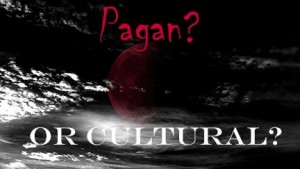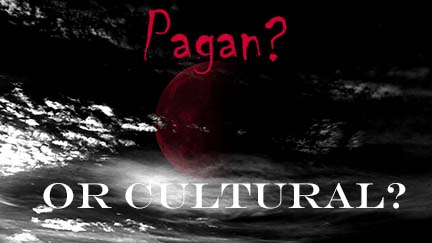 One of the more frustrating aspects of teaching Biblical context is dealing with those who misunderstand the difference between cultural expressions of respect, and pagan worship so I want to talk about it today. It’s really an incredibly important distinction to make because of all the memes and posts I see about “paganism” out there on the internet, it is the third-most common factor among them (the first, of course, being the passing on of unsubstantiated claims- but that’s the common denominator in the posting of almost everything on social media, from political attacks to outright spoof stories from parody sites, and second would be the lack of understanding between the idea of actual “pagan” worship involving literal graven images and the symbols (click the link for yesterday’s amazing archaeological announcement related to this subject) that at one time or another have been associated with the cultures who worshiped false gods).
One of the more frustrating aspects of teaching Biblical context is dealing with those who misunderstand the difference between cultural expressions of respect, and pagan worship so I want to talk about it today. It’s really an incredibly important distinction to make because of all the memes and posts I see about “paganism” out there on the internet, it is the third-most common factor among them (the first, of course, being the passing on of unsubstantiated claims- but that’s the common denominator in the posting of almost everything on social media, from political attacks to outright spoof stories from parody sites, and second would be the lack of understanding between the idea of actual “pagan” worship involving literal graven images and the symbols (click the link for yesterday’s amazing archaeological announcement related to this subject) that at one time or another have been associated with the cultures who worshiped false gods).
So how do we know what qualifies as “pagan” (Note: I do not agree with the usage of this term as it doesn’t mean “pertaining to the worship of false gods” as it is commonly used – but simply means the member of a non-mainstream religious group and by that definition Muslims are not pagans – however I will use it for clarity sake)?
A commonly misappropriated verse of scripture is Deut 12:29-31
29 “When the Lord your God cuts off before you the nations whom you go in to dispossess, and you dispossess them and dwell in their land, 30 take care that you be not ensnared to follow them, after they have been destroyed before you, and that you do not inquire about their gods, saying, ‘How did these nations serve their gods?—that I also may do the same.’ 31 You shall not worship the Lord your God in that way, for every abominable thing that the Lord hates they have done for their gods, for they even burn their sons and their daughters in the fire to their gods.
God has certainly told us how He desires to be worshiped, but there are things that are *unique* to the worship of other gods that we are not to do for Him. Child sacrifice would be at the top of that list, along with ritual prostitution, sacrificing inappropriate animals, women priestesses and for that matter the taking of priests from anywhere other than a specified bloodline (which the Romans violated), choosing kings from the inappropriate bloodline, having sacred groves, making altars outside of the designated place, making idols and serving them (they literally did serve them, the Temple staff would bathe, feed and put their idols to bed in their temple ‘home away from cosmic home’) – that sort of thing.
However, there are things done for God that are also done on behalf of other gods – animal sacrifice (goats, sheep and cattle), offering up prayers and petitions, swearing oaths in His Name, bowing and prostrating oneself, building a temple, having sacred furniture and holy offices, burning incense, and lighting lamps, singing hymns, and doing good works to His oppressed and vulnerable ones, as well as general acts of obedience.
Throughout the Ancient Near Eastern and First Century world, we see common methods of rendering honor – and the concept of rendering honor is important because there are going to be standard ways by which all gods are going to be honored. Pagans would have recognized the same legitimate ways of rendering honor, whether it was to man or gods, that Israelites would have. There are things that you did to honor God and men, and things you did to shame them. If the ways of honoring the God of Abraham, Isaac and Jacob were entirely unique to His worship – then they would not have been honoring Him in the eyes of the Nations, who looked at their actions and said, “Wow, these guys really know how to honor their god, He must be a mighty god indeed!” Instead, they would have been like, “What the heck are they doing? Is that barbeque? Those idiots are waving sheaves of barley like madmen and what is that smell? Some weird perfume – are they smoking in that little tent?”
So I did a social media post the other day because of something I noticed about the way that Dagan, the Philistine god of agriculture and death (those two concepts were often tied together in the ANE, even Yeshua said that a seed ‘dies’ in the ground – it isn’t scientifically accurate but it is what they thought because they weren’t scientific minded but spiritual minded – Yeshua spoke to them according to what they could understand, He did not come to teach science but instead God’s truth) was honored through the intermediary of his idol in Mari. His priests would take perfumed oil and bathe his feet (Felui, 104) and I immediately saw the honor that they were rendering to that god – and yes, honor rendered to Dagan is idolatry, of course – and made the connection to what Mary did to Yeshua’s feet right after He raised her brother from the dead. She was rendering that same cultural honor – bathing the feet in ‘ointment’ which was a spikenard oil. Some folks got a bit upset because they mistook her rendering honor to Yeshua for doing something inherently pagan – but why should we consider rendering honor in and of itself necessarily pagan in nature? Why do we not simply accept it for what it was? We know from Scripture that to wash someone’s feet was to render them honor, and so to oil and perfume them was an even greater honor. Mary was treating Yeshua like a King and like the Son of God, but if we have it in our heads that every sort of way to give honor is pagan we will end up chasing our tails. Chasing “paganism” has become an epidemic, and the fruit of it is generally over-reaching skepticism and contempt – people become obsessed with rooting it out, and with being offended over any possible instance of it but often without really studying it out and really looking into the ancient mindset (which was nothing like our own – it was NOT possible to commit idolatry accidentally, it took effort and intent).
There is absolutely nothing that I or anyone can legitimately do for YHVH that was not also done for other gods – because honor is honor, and there were legitimate ways to give honor in the ancient world. We have lost sight of this and so we tend to cry pagan when we see some expressions of respect. It really did bother me before I learned to make this distinction, and throughout the Word we see YHVH referred to by epithets that were specifically used to describe other gods. Were those epithets pagan in nature – as in when YHVH was called the Rider on the clouds in Psalm 104 (that was also the designation for Ba’al)? Are compliments inherently pagan in nature, or are they cultural? There are very frankly things done to other gods that YHVH loves to have done for Himself, when, where and how He specified it be done. There are things that are done to worship Him that are not found in the Torah but instead found in the Psalms – cultural expressions of adoration that didn’t need to be written in the Torah because everyone knew how to honor a god – that’s why He went to great lengths to specifically tell them which ways to exclude. Now sometimes we do need to learn precisely what was meant by those prohibitions or else we will sort of expand them to include anything that sort of sounds equivalent to our modern sensibilities and start whacking people on social media because of the way something sounds in English. Jeremiah 10 is the most prominent example (especially if one limits themselves to a few verses out of context) – if one hasn’t studied ancient idolatry and the actual manufacture of the big city idols of Mesopotamia, it is easy to decide it means something else entirely. The problem is, where do we stop – and how do we tell other people not to inject modern meanings into scripture if we ourselves are doing it? How do we dare eat cheeseburgers when there are those who say that “Do not boil a kid in it’s mother’s milk,” prohibits it, but only outside of the ANE idolatrous context of the Canaanite ritual? We cannot criticize Mishnaic rulings out of one side of our mouths while doing it ourselves with our own creative spiritual applications.
You know, it really is okay to just admit that we don’t understand how they thought and lived and what things meant to them. What’s not okay is to presume that everything written to an ancient, spiritual, communal, nomadic people living in a henotheistic reality is going to make sense to a modern, scientific, individualistic, settled audience living with a monotheistic worldview. What’s really not fair is to read the Scriptures in English according to our modern mindsets and to assume that the vast differences in culture don’t seriously influence the integrity of what we think we are seeing written. We need to be really humble, and to make sure we know what we teach before we hold people accountable to our interpretations of Scripture. After all, how would our interpretations be superior to those 1000 years ago? 1500 years ago? The ways people think and the things they do have changed radically – so why are our interpretations based on our modern culture better than those of what was “modern” in the middle ages? Unless we are taking into account what we have now that they didn’t, archaeological context, we really can’t!
Now, before someone nails me to the wall (as has been done recently) – no one who knows me seriously thinks that I approve of Christmas or Easter, or celebrate them, or even want to. We have legitimate Feasts that we are commanded to keep with God forever as His children and they are enough for me. Christmas and Easter are both traditions (of questionable European origins) that I want no part of and there is no real way to honor God by ignoring His chosen celebrations and creating new ones. That wouldn’t fly in our own homes and it isn’t going to work in His Household. But we have to be careful when using words like pagan and idolatrous because they mean really precise things – like grace, holiness, covenant and a whole host of other things that are often cultural and very specific in nature but which we have been taught to spiritualise away. The Mishnah actually has a great write-up on what constitutes idolatry in Tractate Sanhedrin and let me tell you they were dead serious about idolatry (Kehati has a great commentary on it)! When we do not know what things mean, we can make them mean whatever it is that we want them to mean and hold people to standards that are misinformed and oftentimes unreasonable.
I have noticed that this time of year, many believers get completely derailed by hunting down paganism and oftentimes post things that are inflammatory, untrue and unfruitful all mixed in with things that are true – and then people make decisions to stop doing things they love for the wrong reason, which means that in their heart they never really stopped. That was me ten years ago – I gave up Christmas and Easter because people told me they were bad (and gave me illegitimate reasons why) but they never replaced them with anything. You want to know why I really gave them up after starting to celebrate them again years later? The Feasts of the Lord – once I discovered them I didn’t want the counterfeits and now I would never dream of going back. We should want people to keep the Feasts so that we can honor God in the ways that He has commanded, in the ways that teach us and our children about the Messiah, but it is really easy to get sidetracked away from that and to just focus on Christmas and Easter instead – to be more against Christmas and Easter than we are for God and His Feasts. People get trapped in the mode of being “against” what they hate and they forget how to be “for” what we are called to love, and then they slip back into the same trap we were in before we found Torah. A lot of us, when we came to Torah, got angry when folks wouldn’t listen to ‘reason’ – they wanted to defend their beliefs and would believe anything that they read in support of what they believed, no matter how much proof we would supply. Then when we latch onto something we want to believe that might not be true, oftentimes we do the exact same thing – we will argue with anyone or anything, no matter how much proof someone might offer that we could be mistaken. We really don’t change much – even though we would like to think we do. The deal is – when we have an emotional need to believe something, whether it is rooted in fear, or hatred or pride, or just the jealous protection of beloved memories – we are blinded and there is only one cure for it. We need to realize it and ask to have sight – and we need to keep asking and never stop. Not only that, but when we are passionate about something, we need to stop and examine if it is a holy passion, or one rooted in flesh – God is generally the only one who knows for sure.
Have a wonderful week.
Feliu, Lluis The God Dagon in Bronze Age Syria, Brill, Boston 2003






















This is perfect timing! I have been doing a lot of thinking about this subject lately. Also, I have talked to God a lot about Christmas and the observance of it. He has gently reminded me that Christians are not seeking to worship false gods through the observance but believe they are honoring Him. I have chosen to post things about God’s Holy Days rather then address Christmas observance and will simply love God’s people wherever they are in their walk with Him.
I do thank you for writing this. You have put words to what have been so many of my own thoughts over the past eight years. I was raised in a very observant and loving Evangelical home, church, and school. At thirty I entered the Catholic Church, not because I believed the Evangelical was wrong but because I received a fuller understanding of my own faith. Then about nine years ago I was introduced to Messianic understandings. Again my faith has been increased and my ability to love my God, my neighbour and myself has increased.
I have not abandoned any of my ways of loving and obeying God or of loving and serving my neighbour. I have not left the Catholic Church and I have not disputed any of the teachings and practices of people who follow Torah. So many times I have listened to people make statements about Catholic practices which are untrue and ill informed just as I listen to others do the same about Messianic believers.
I believe we are all called to know one another by our fruits as instructed by our Redeemer. This requires us to watch and observe how others produce ‘the fruit of righteousness’ in their lives. Let us not be hasty to be looking for fault at the outset. There is no love in that. We may correct our sisters and brothers out of love for the salvation of their souls , both now and for eternity. However, let Love be our aim first.
One of my favorite verses: Micah 6:8 He has told you, O man, what is good; and what does the LORD require of you but to do justice, and to love kindness, and to walk humbly with your God?
It is not for one man to dictate to the conscience of another, or to resort to scare tactics or outright lies in order to get people away from what we believe it wrong – no matter how strongly we believe it. Yeshua preached the truth, and let the chips fall where they would fall – letting all make their own choices without manipulation. Oh if we only loved each other enough to just be straight with one another. Nice to meet you Lovelett and welcome to my blog 🙂
Sorry, one question: If I am for the appointed times, and not necessarily against the traditions of Easter and Christmas, how do I walk this out with family who celebrate Christmas and Easter? Do I participate in the traditions with my family, but worship God according to His appointed times? Is there anything wrong with that?
Thank you!
Oh boy, I am the absolutely most wrongest person to ask because we have never lived near extended family. I have honestly never had to deal with it! I don’t approve of Christmas and Easter personally, so I do not celebrate them – Easter, “Pascha,” is honestly looking less and less identifiably pagan all the time as people I respect do the research into the actual origins (which aren’t as nefarious as I once thought). However, I still don’t celebrate Easter, but the Passover and First Fruits – of course, I have to ask myself, when it is termed “Ressurrection Sunday” and a Church doesn’t approve of the eggs and bunnies (which are not fertility symbols in any ancient Near Eastern or ancient European culture – in fact, eggs have always been “new life” symbols and weigh into a lot of Creation mythology) and all they focus on is the Resurrection, I have to ask myself if they are any different than me on first fruits? Probably not.
Christmas is more iffy, but I know a ton of solid Torah keepers who go to their families homes during that season and just celebrate life together. Like I said, I just haven’t had to cross that bridge yet, but I don’t tell anyone else what to do nor what to do either. I do know a lot of Jewish families who don’t think twice about attending a Christmas party because they see it as harmless – they see idolatry as something intentional, where a divinity is actively worshiped. Jewish law is pretty straightforward about it – violations have to be pretty darned intentional, with the intention being to worship a foreign God.
So really, it all depends – what I do tell people is not to spitefully cut off family as I did for many years. Sharing life together is important, Biblically.
Thank you. This is good advice that I’m glad to hear from someone who has been through it. I am in such a weird middle place at this point. Some in my life would say that observing the traditions with family is not ok. Others in my life say that keeping the appointed times is not ok. Thankfully, as one of my friends would say, I am seeking only one “Well, done.”
“…it is really easy to get sidetracked away from that and to just focus on Christmas and Easter instead – to be more against Christmas and Easter than we are for God and His Feasts. People get trapped in the mode of being “against” what they hate and they forget how to be “for” what we are called to love, and then they slip back into the same trap we were in before we found Torah.”
Yes! Thank you for this! This has been on my heart a lot in the last few months with Christmas, and now Easter approaching. The arguments against such holidays are weak compared to the surpassing greatness of the reasons for celebrating the appointed times.
Tyler, thank you for sharing your research as well as your heart! I appreciate your teaching!
Hah! I keep coming back to this one!
I recently used the verse from Deuteronomy 12 to explain why I don’t do yoga. I figure if Hindus worship their gods, in part, by doing yoga, then God doesn’t want to be worshipped that way. But you mentioned that it takes effort and intent to commit idolatry. So, does that mean that “Christian Yoga” is ok?
Thank you!
Hmmm… I will be completely honest. I know nothing about yoga. I don’t know how or even if it is used in pagan rites. I mean, I hear people make claims but I have never looked into it because I don’t study anything that isn’t directly related to the Bible. People make claims about just about everything and a lot of those claims are lies, so I just take things one at a time if needed. Plus, I hate exercising and it is all I can do to get myself to jog on the treadmill so I will probably never have reason to look into it.